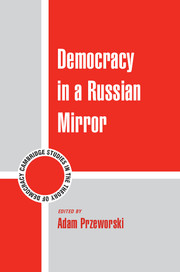Book contents
- Frontmatter
- Contents
- Contributors
- Introduction
- PART I RUSSIA
- PART II DEMOCRACY IN A RUSSIAN MIRROR
- 5 Judging Democracy as Form of Government for Given Territories: Utopia or Apologetics?
- 6 Democracy: Ancient and Modern, Good and Bad
- 7 The Role of Elections in Democracy
- 8 Elections and the Challenge of More Democracy
- 9 Democracy between Elections
- 10 General Settings, Regional and National Factors, and the Concept of Non-Western Democracy
- 11 “Non-Western Democracy” in the West
- PART III PATHS OF POLITICAL CHANGE
- Afterword: Open Issues and Disagreements
- References
- Name Index
- Subject Index
11 - “Non-Western Democracy” in the West
from PART II - DEMOCRACY IN A RUSSIAN MIRROR
Published online by Cambridge University Press: 05 June 2015
- Frontmatter
- Contents
- Contributors
- Introduction
- PART I RUSSIA
- PART II DEMOCRACY IN A RUSSIAN MIRROR
- 5 Judging Democracy as Form of Government for Given Territories: Utopia or Apologetics?
- 6 Democracy: Ancient and Modern, Good and Bad
- 7 The Role of Elections in Democracy
- 8 Elections and the Challenge of More Democracy
- 9 Democracy between Elections
- 10 General Settings, Regional and National Factors, and the Concept of Non-Western Democracy
- 11 “Non-Western Democracy” in the West
- PART III PATHS OF POLITICAL CHANGE
- Afterword: Open Issues and Disagreements
- References
- Name Index
- Subject Index
Summary
INTRODUCTION
A central claim of various projects of “non-Western Democracy” is that democracy need not embody the institutional features that characterize it in contemporary “Western” democratic systems, specifically, opposition organized in political parties and contestation of control over government in the form of electoral competition. This stance is epitomized by Sukarno, the first president of Indonesia, who thought that parliamentary democracy was a foreign import that “incorporates the concept of an active opposition, and it is precisely the addition of this concept that has given rise to the difficulties we have experiences in the last eleven years” (quoted in Goh Cheng Teik 1972, 231). The Indonesian political tradition, Sukarno maintained, was to reach collective decisions by consensus. Democracy had to be “guided,” based on mutual cooperation rather than on partisan conflicts.
This claim, and the argument behind it, is canonical, even if it comes in variants. The point of departure is either that the society is naturally harmonious – the people is united as one body – or at least that the goal of politics should be to maintain harmony and cooperation. Political divisions are artificial, spuriously generated by selfish and quarrelsome politicians. If they were allowed to be organized, most importantly through political parties, they would become dangerous: once conflicts are permitted to see the political light, they are unstoppable and lead to a breakdown of order, even to civil wars. Moreover – here we get invocations of what Schmitter and Karl (1991) dubbed “the bias of electoralism” – purely procedural rules need not generate wise or virtuous outcomes. As Lagerspetz (2010, 30) observed, “there is something deeply disturbing in the idea that a purely mechanical, content-free procedure could determine what we should do.” Finally, nationalistic appeals never hurt, consensual decision making is deeply rooted in the national tradition, while “formal democracy” is a foreign, Western import.
- Type
- Chapter
- Information
- Democracy in a Russian Mirror , pp. 212 - 226Publisher: Cambridge University PressPrint publication year: 2015

